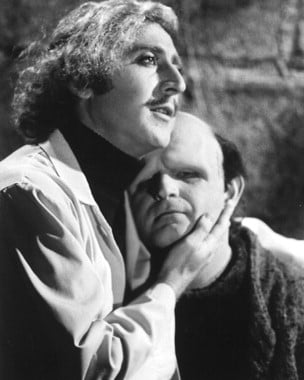A couple of years ago, when former California Governor and movie icon Ahnohld Schwarzenegger’s revealed his dalliance with one of his domestic employees, I wrote a tongue-in-cheek response to the “shocking” news. I framed it as a letter to those opposed to letting gay people marry, and suggested that the crowd to whom we should deny marriage is the group of people who, historically, had proven themselves really, really bad at it.
I am talking about superstars in the businesses of entertainment, politics and sports. THESE are the ones for whom marriage is not natural. Of course, not all superstars in these fields practice infidelity, and not all of us regular folk stay true to our spouses. Regardless, can we please just assume that once a politician, athlete, actor, musician, etc., reaches a certain level of success and fame that their ability to remain faithful to their spouse is seriously compromised?
Let’s go down the list of suspects, here:
-
People whose careers involve staying gorgeous and taking their clothes off with other gorgeous people and pretending to be in love with a different person for each movie,
-
People whose chosen paths involve lengthy absences from their families while they are worshipped and fawned over by people seeking all kinds of favors and favor,
-
People whose prowess on the athletic field guarantees they will be showered with offers to demonstrate their prowess off the field, and
-
People who actively pursue careers wherein success equals ungodly fame, extreme wealth, wielding great power, and obscene stroking of egos as a matter of course.
I’d like to strike a more serious tone, though, when talking about our elected officials. Of course, they fall into categories 2 and 4 of the above list. In “The Hypocrisy of the Powerful,” Dr. Robert Smither discusses how politicians caught up in sex scandals “do things that are completely opposite of the image they present to voters.” That’s true of Eliott Spitzer and Larry Craig – both advanced their political careers by expressing loud moral outrage in public about behaviors in which they personally engaged in private. Simply put, they were hypocrites. They also broke the law. Somehow, though, I don’t feel it’s as striking as Dr. Smither does.
This is because we have yet to come to terms with the obvious truth about which I joke in my list above. Of course people in power consider themselves infallible. Of course people in power have no trouble forgiving their own bad behavior while condemning others who engage in the very same behavior. People don’t ascend to positions of great power – especially political power – because of their forgiving and humble natures. In fact, I really think if you’re forgiving and humble, and somehow manage to ascend to great power, it is not because of those qualities, but rather, despite them. I’m speaking in ridiculously broad generalizations, here, but you catch my drift.
Sincere apologies for sounding crass, but it doesn’t upset me when I hear a politician has been unfaithful to his or her (come on, though, you know we’re mostly talking about “him”) spouse. It upsets me that I hear a politician has been unfaithful. Here’s why:
1. I don’t think it’s any of my business. It’s between the politician and his or her spouse and family. And the third party, whomever it is. And their clergy, their lawyers, and their therapists, should they have the inclination to consult such people. I think primarily of the innocents in these scenarios, and how painful it must be to have their humiliation played out in front of hundreds of millions.
2. I don’t equate fidelity to one’s spouse with the ability to govern. Plenty of talented surgeons, artists, etc., might be unfaithful, but how often does that cost them their jobs? Yet I know news of infidelity often ends a political career. If it doesn’t end a career, it creates a huge distraction from it, and an opportunity for the opposing side to claim moral superiority. THAT makes me gag.
3. The fact we hear about it is reflective of the fact we have such an appetite for it. I fear that speaks very poorly of our priorities and our national maturity. I mean, I was embarrassed and ashamed during the Clinton/Lewinsky scandal – not because our President had an affair, but that his lying about it led to his impeachment. What a farce and waste of resources and energy that was.
Which brings me to Anthony Weiner. Full disclosure – we’re from the same part of Brooklyn, his younger brother went to my high school and owns a restaurant where I once enjoyed a superb meal. None of that, though, brings anything to bear on the fact that I find it tragic that such a smart guy with such great potential, fighting the good fight (in my eyes, at least) has lost his voice in Congress just because he tweeted d*ck pics to some college hotties. I mean, here’s a guy who managed to SHUT Joe Scarborough UP about health insurance companies. Here’s a guy who went on an epic rant in Congress making Republicans look like idiots for defunding NPR. (Ironically, now that he’s running for Mayor of New York City, the endorsement that would help Weiner the most is the one he’s not going to get – the Clintons’. They’re not going near him with a 10-foot cigar, for obvious reasons.)
I understand the argument of some that it’s hard to vote for a politician who exhibits such bad judgment. If he or she is so careless in his or her personal life, how can I trust him or her with matters of great significance? That’s a completely legitimate question to ask. Again, though, I wonder why we don’t think infidelity makes a doctor less medically capable or a conductor less able to lead an orchestra.
I consider role model status for national politicians to be extremely fuzzy when it comes to their personal lives. If we removed the specter of their personal lives being dragged through the mud, might we have a more focused Congress? If we didn’t so delight in publicizing private lives of the rich and powerful, might we be able to then insist they concentrate at the work at hand that really DOES matter? If running for office didn’t automatically mean subjecting themselves and their families to the media dumpster diving that is sure to follow, would more people who would make good politicians step up to the plate? I don’t know what the answer is. I’m not sure what is the right thing to do. What we’re doing isn’t working, though, that’s for damn sure. How else can we explain that Congress has a 10% approval rating, yet 90% of incumbents are re-elected? To what degree are we, the governed, responsible for the incredible dysfunction of the government about which we complain so loudly?
This post originally published at The Broad Side on June 20, 2013.















